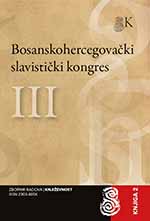Rat i jeza u prozi Zilhada Ključanina, Irfana Horozovića i Karima Zaimovića
War and the Uncanny in Prose writing of Zilhad Ključanin, Irfan Horozović and Karim Zaimović
Author(s): Almir BašovićSubject(s): Language and Literature Studies, Studies of Literature, Bosnian Literature
Published by: Slavistički komitet BiH
Keywords: horror; war; carnival upheaval; mechanical – organic; revival; martyr; Entwerter; vampire; siege;
Summary/Abstract: The notion of Uncanny in European literature develops as a sort of a substitution for the effect of tragedy as an horror organic form. Sigmund Freud associates this phenomenon with fears of castration, with the cleavage of Ego in the image of the Double, with fear of that which is repressed, nearness of death, etc. The Uncanny may be understood as it is defined by Ernst Jentsch, who writes that the impression horror of can be related to the lack of orientation, and that among all the psychic insecurities which may become the cause of horror, there exists one particularly capable of developing a strong, even and a very general effect – skepticism whether or not a being is alive or dead. Having this in mind, it seems that the notion of horror can be considered with regards to war fiction, in this case – prose written by Zilhad Ključanin, Irfan Horozović and Karim Zaimović. In his novel Šehid Zilhad Ključanin develops his central line on the “liveliness” of a figure that deserves his ontological state by dying in a war (which is the meaning of the word “Šehid”). In the novel Berlinski nepoznati prolaznik Irfan Horozović connects the war with the lack of orientation and psychological insecurity by treating recent historical events through “magical realism”, a perspective typical for his narrative technique. In his book Tajna džema od malina Karim Zaimović utilizes literary devices that would produce horror under regular circumstances, but Sarajevo’s reality during the war is terrifying to the extent that these devices produce only a comic effect. The question posed by Ernst Jentsch – is a certain thing alive or dead – cannot function as a metaphor in the besieged Sarajevo, therefore Zaimović makes a parody out of Freud’s rationalism and fear of castration, which are both during this period in Sarajevo present as a tangible fear of being bombarded. In that sense it is possible to state that stories written by Zaimović are marked by a sensibility that can be named − nostalgia for a normal fear.
Journal: Bosanskohercegovački slavistički kongres
- Issue Year: III/2022
- Issue No: 2
- Page Range: 147-162
- Page Count: 16
- Language: Bosnian

